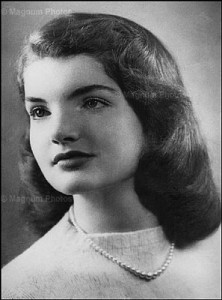I remember hearing about the Jacqueline Kennedy papers or diaries or interviews – whatever they were – and the fact that they would be sealed up for seventy or seventy-five years before being released. The presidential widow intended to protect the privacy of her children, while realizing that there would still be interest in her thoughts and impressions regarding her time in the White House.
At the time I thought: Well, I won’t live long enough to ever be privy to that information.
Low and behold. The book is on the front counter along with the CD collection that contains Kennedy’s conversations with historian and former White House aide Arthur Schlesinger, Jr. The release is timed to commemorate the 50th anniversary of John F. Kennedy’s first year in office.
Apparently, there is still an interest.
More than eight-million viewers took to the sets to watch Diane Sawyer present a program on the book and audio release, not quite NFL football-viewing numbers, but still substantially more than the top-ranked show on Monday evening.
I listened long enough to decide I didn’t want to hear any more.
The audio was recorded in 1964, a time that was stuck in between the I Love Lucy and Ozzie Nelson era and the feminist-movement genesis that followed. In the former, women were – as a rule – happy to stay at home and raise the family while the husband served as the breadwinner. Women weren’t expected to offer much in the way of political opinions. That changed, obviously.
Unfortunately, the part of the Kennedy conversations I heard indicated that the First Lady was mired in the homemaking age, despite her social-status, education, and political position. She made remarks to the effect that “Of course Jack was right. What would I know about politics?” That’s a paraphrase, since I changed the channel quickly enough that I didn’t memorize the quote.
Sometimes the perception held in memory is better than the truth. I was a child when John Kennedy was assassinated, and although some of my recollections of the time are quite vivid, I would have known little of the social framework in which that time was entrenched. Looking back on some things, the time seems so far away as to be fiction.
In 1964, there were still separate drinking fountains at the train station in my home town. Officials tore down the station rather than integrate the facilities. (Maybe that is only my impression, but the timing was suspect, at best.) There were separate high schools for blacks and whites. There were certainly women in colleges, but many considered keeping house as a preferred occupational path.
It was a different time – one so removed from our current state that it is almost impossible to imagine the differences in thinking. The dream of Camelot and its shining example, the wealthy Kennedy and Bouvier families on the throne reigning over the placid masses – were all changed by the assassination.
The widow remarried. Many suspected it was to insure her privacy and her way of life. Later, she returned to the US and New York and made a new image for herself in the publishing world.
The audiotapes of the young widow will provide insights for some, but for me, a taste of what seemed to be little more than shallow gossip was enough to make me search out less bitter fare.
